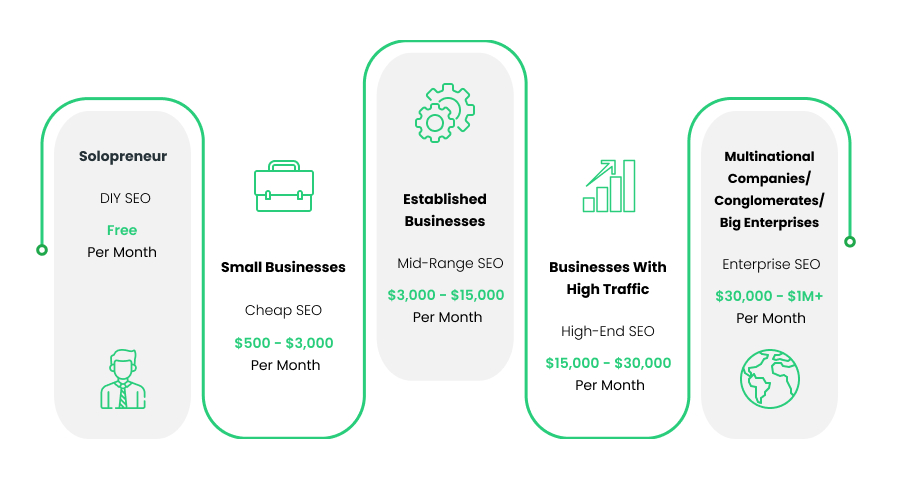How to Plan and Budget for SEO?

Are your SEO strategies not working out? Or do you think you’re spending more than your competitors on your SEO budget plan? If your answer’s yes to any of the above, you might need to rethink your strategy.
Today, we’ll be discussing the SEO strategy you can use to drive organic traffic to your cannabis business. The U.S. cannabis market is growing at a CAGR of 14.9% and is projected to reach a size of 40 billion USD by 2030. If you’re planning to become a leading cannabusiness in the U.S., proper search engine optimization planning and budgeting is essential.
So, hang tight as we take a deep dive into SEO strategies. We’ll discuss details of how to split your marketing budget, how much you should ideally spend, and the plan you need to leverage to set up the best SEO services to fuel more organic traffic.
However, before all of that, you must invest time in planning and checking out various SEO services. So, let’s kick off your journey by looking at how to set out an SEO budget plan. Learn how much to spend on SEO and cut costs from your annual budget.
How to Split Your Marketing Budget?
When kicking off your brand, deciding on a single marketing budget is essential. Your budget will capture all the activities and give you a fair idea of the ROI you’re raking in. This step is the first one when setting out the groundwork for an effective SEO marketing plan.
Marketing Goals
The first element of creating a budget SEO strategy is to determine what your ultimate marketing goal is. Marketing goals vary depending on the type of business you have. For instance, if you’re an e-commerce store for cannabis products, your goal will be to increase your website traffic. Alternatively, if your brand sells a single proprietary product, your SEO marketing budget will aim to increase brand awareness.
Determine Your SEO Budget Proportion
To ensure you make the most out of your existing digital marketing budget, determining what proportion you’re ready to dedicate to SEO is essential. Thus, along with other channels of marketing, estimate how much your business is ready to spend on SEO. In the best practice, your budget for SEO should be 10-30% of your entire digital marketing budget.
Optimize the SEO Budget
Following a 70-20-10 rule is recommended when optimizing your SEO budget. According to this rule, 70% of your SEO budget must be used to optimize existing SEO elements like old blog posts, page speed, improving website performance, etc.
The next 20% needs to exploit newer SEO technology. Top trends you can focus on are:
- Developing original content
- Voice search optimization
- Keyword research
- Video marketing production and deployment
- Leveraging the power of influencer SEO
- SEO using Artificial Intelligence
Finally, the remaining 10% of your SEO campaign cost needs to cover the weak links in the strategy. It may include optimizing your Google My Business account, deploying high-resolution images to your website, etc.
Comparing Your SEO Budget to the Pay-Per-Click Budget
While creating a budget SEO plan, comparing your PPC budget will help. PPC campaigns are quick and consequently popular. However, using them for far too long yields a reducing ROI curve. Compared to it, SEO returns keep rising with time. That’s why you must launch your SEO simultaneously with your PPC campaign. Additionally, you must also have a greater initial SEO budget. With time, your budget for SEO keeps reducing and the ROI keeps increasing.
How Much Should I Spend on SEO?
You may be wondering how much to spend on your SEO. Before you select a number, making a few key considerations is essential. Pay attention to the elements we’ll be discussing as they are essential for determining your SEO budget.
Different businesses require different SEO budget plans. Due to this, it’s essential to know what your firm’s size is. The list of SEO corresponding to business size is as follows:
- Solopreneur – DIY SEO @ free per month
- Small Businesses – Cheap SEO @ $500 – $3,000 per month
- Established Businesses – Mid-range SEO @ $3,000 – $15,000 per month
- Businesses with High Traffic – High-end SEO @ $15,000 – $30,000 per month
- Multinational Companies/Conglomerates/Big Enterprises – Enterprise SEO @ $30,000 – $1M+ per month

Thus, when creating a budget for SEO, understand your business requirements well. Depending on the same you can either fly solo or hire an SEO marketing team.
How to Plan an SEO Budget?
When planning an SEO budget, you must remember all the SEO elements. It ensures an effective SEO marketing plan that can get you results.
Link Building
Link building varies depending on your SEO goals. Thus, understanding what you want to achieve using link building is essential. The top link building strategies are:
- Replicating Competitor Backlinks – This strategy leverages your competitor business backlinks for SEO. A simple tool search provides historical data and relevant statistics you need, to leverage the strongest opportunities in the market. Your backlinks can land customers on sales pages or your marketing website.
- Broken Link Leverage – Broken 404 links on sites relevant to your domain can be effective SEO inbound links. Using these pages is a win for you and the hosting business.
- Images – Using images as backlinks is a powerful strategy. Customers in today’s market appreciate visual media more than written media. So, backlinking to images can get you better results.
- Guest Posts – Guest posts are a new way to add credibility to your business. Using a Guest Post can not only create a successful backlink but also ensures endorsement for your business. Guest blogging helps in creating referral traffic.
- “Best of” Lists – “Best of” lists on websites with high authority are an exemplary way to generate results. These lists add tons of credibility to your products and the backlinks have a higher click-through rate.
Thus, the first step of your search engine optimization plan is to determine whether you want to employ one, or all of the above link building techniques.
Content Development
“Content is king”, is a phrase you might have heard quite often. However, not everyone understands it. One of the best ways for creating a budget SEO plan is to optimize content.
Some of the best ways to market your content is:
- Building better-targeted landing pages for customers
- Segmenting your audience to increase engagement via each channel
- Knowing your audience and understanding what social trends get them going
- Focusing on facts and data through analysis (of elements such as keyword rankings) and A/B testing
- Use adaptive content that provides meaningful interactions to target Millenials and Gen Z
- The Hedgehog content model is a proven strategy for content marketing
- Craft content that’s based on your brand’s core values
- Native advertising is an untapped but powerful territory
- Use local content to generate more local traffic
- Designing how-to articles that are rich in information
The above list is not exhaustive. In today’s dynamic environment, leveraging the power of content helps you personalize your brand’s experience. Thus, spend on SEO content and build your brand from the ground up.
Additionally, always remember to incorporate relevant keywords. They help improve your page’s ranking. You can use the Google keyword planner to strategize the use of keywords across your content.
However, we strongly do not recommend using all of these strategies. Find the right ones to mix and match and deploy them. It helps you keep your budget for SEO under control while maximizing your ROI.
SEO Works
There are four broad types of SEO strategies you need to implement to reap the benefits.
Using these four SEO strategies in tandem will enhance your ROI:
- On-page SEO – On-page SEO optimizes your SEO content while integrating keywords correctly into your marketing plan. Additionally, it also focuses on internal linking, metadata optimization, and image optimization.
- Off-page SEO – Off-page SEO is referred to as the backend of SEO efforts. It’s a mix of paid and unpaid strategies in your SEO budget. It consists of guest blogging, reporter interviews, competitor research and analysis, internet ads, and press distribution.
- Technical SEO – This branch of your SEO strategy will optimize your website by enhancing elements like site load time, mobile friendliness, crawl error identification, mitigating keyword cannibalization, and conducting duplicate content audits.
- Local SEO – Local SEO leverages the power of customer proximity. Local SEO ensures that customers at a certain geographical location can reach you easily. Popular keywords used in such campaigns can be “pre-rolled cannabis stores near me”.
SEO works form a considerable portion of your SEO campaign cost because it helps maintain the integrity of your live SEO campaigns. If you’re more than willing to invest a generous amount for SEO spending, we recommend investing in this element. Getting yourself an in-house team of experts and a marketing manager, can help you optimize search results, enhance customer lifetime value, and unlock the potential of the marketing channels you use.
SEO Tools
SEO tools are quintessential for good SEO. The best part about tools is that many of them are free. Even the paid tools are quite cost-effective.
The 5 best tools for creating a budget SEO are:
- Ahrefs – It’s one of the best SEO keyword search tools around. It helps you conduct competitor analysis, search for effective backlinks, data on pages that are performing the best, etc. You can use it to enhance your SEO strategy.
- Google Search Console – This is one of the best free tools for people running SEO on a budget. It helps you analyze and report your website’s current status in Google SERP. To verify your site, add a code to it or submit a sitemap using Google Analytics.
- Semrush – Semrush is an absolute fan favorite when it comes to SEO. The tool helps you assess your website rank and quickly informs you reading newer market opportunities. Running your SEO campaign according to Semrush’s results can help you leverage the power of organic SEO. It helps minimize your SEO campaign cost-effectively.
- Moz Pro – Moz Pro is a powerhouse for effective SEO. Using it hits multiple birds with one stone. It’s always up-to-date with Google’s algorithms and has recommendations for keywords, site crawl, etc.
- Ubersuggest – Ubersuggest is a blessing to any brand’s digital marketing strategy. It gives you insight into short and long-tail phrases. Ubersuggest’s top-ranking SERP recommendations can truly add to your overall SEO plan.
Thus, leverage the power of the major SEO budget elements to optimize your overall marketing budget!
SEO Budget Plan Example
When setting out an SEO budget, we recommend determining the type of business you have. We’ve created 3 template plan examples to give you an idea of what your SEO budget will look like, depending upon the size of your business for outreach SEO.
Small Scale – Single Product Brands
| SEO Budget | ||
| Links | $3,300 | 15-20 outreach links per month |
| Content | $2,000 | 10-15 On-page optimization + new pages |
| SEO Work | $4,500 | 1 Specialist SEO Manager |
| Total | $9,800 | |
| Promotion Period | 12 months | |
| Goals | 40k+ per month | |
Mid-Tier Business – Lots of Page Visits
| SEO Budget | ||
| Links | $7,000 | 35-40 outreach links per month |
| Content | $5,000 | 30-40 On page optimization + new pages |
| SEO Work | $15,000 | 3 Specialists (SEO Marketing Team/ In-house Team) – 1 SEO/Marketing Manager + Specialists |
| Total | $27,000 | |
| Promotion Period | 12 months | |
| Goals | 100k + per month | |
Enterprise SEO – Large Businesses
| SEO Budget | ||
| Links | $14,000 | 70-80 outreach links per month |
| Content | $12,500 | 60-70 On page optimization + new pages |
| SEO Work | $25,000 | 6 Specialists (SEO Agency with a dedicated SEO Team) |
| Total | $51,500 | |
| Promotion Period | 12 months | |
| Goals | 200k+ per month | |
The above costs are rough estimates of how much an SEO budget can cost depending on the business type. However, they are not the final verdict. The SEO cost for your cannabis business will depend on the SEO budget and the amount of SEO work you want to dedicate. For instance, an E-commerce SEO store for cannabis products will have a higher SEO budget than a store with a single product focus.
Determining How Much to Spend on SEO
Competition in the Niche
Determining the competition in your niche is essential. A strong SEO budget is a result of understanding your business environment well. To do so, you must know the level of competition in your niche. In a niche that has high competition, SEO budgets need to be extended to cover more ground.
Alternatively, SEO budgeting for cannabusinesses can be limited to mid-range. Since the niche is relatively new, lower-than-usual SEO marketing efforts generate better results. However, we do not recommend using cheap SEO. Cheap SEO is ineffective when it comes to driving organic SEO traffic.
Mid-range SEO on the other hand enhances organic search and generates more traffic to your website. You can use one of the top free tools to create a budget SEO approach. It helps keep your search engine marketing costs at a minimum.
Using this tactic, you can also spend on SEO in a way that generates the most ROI. Furthermore, using Local SEO to drive local traffic to your website can help your brand’s growth. The key is to drive the most organic traffic to your website as soon as possible. It gives you the first business advantage in the market and helps you devise a reasonable SEO budget plan.
Developing SEO Goals
Developing SEO goals is the second most important element that helps determine an effective SEO budget. We recommend following the SMART system to develop these goals. SMART goals stand for Specific, Measurable, Achievable, Realistic, and Time-bound, goals.
The goals of your business will determine your SEO goals. One of the top SEO campaign examples we found is the American Egg Board. When facing declining traffic, the brand revamped its approach. Making use of site-wide keyword research and implementation, user intent discovery, improved UX, etc., the brand made it to the top of the search list. This is a classic example of a high-performing and well-constructed SEO budget.
Thus, developing accurate goals for your SEO campaign is crucial. Determine what you want to achieve by using your digital marketing efforts. Then determine which goal SEO will work towards. Is it improving page traffic? Or, is it enhancing brand awareness?
The goals you set out will govern the SEO content that needs to be deployed. It also directly impacts the overall SEO campaign cost. Once your goals are clear, you’ll also be able to set up a pipeline to achieve the same. Your pipeline may focus on paid search marketing or leverage the power of Google Ads. Alternatively, you could also focus on search marketing and social media ads based on your SEO spending capacity. All-in-all, setting goals helps you enhance revenue generation.
Return on Investment Target
The ROI target of your SEO strategy needs to be accurate. To devise the perfect ROI, you need to ask yourself questions like:
- What is the SEO strategy supposed to achieve? Conversions? Page visits? Sales?
- Which market is the SEO strategy tapping into? B2B? C2C? B2C? D2C?
- What are the target audiences and what will my brand gain out of customer conversions? Does your website generate revenue by footfall? Or does it generate revenue by selling products?
Defining the answers to these questions can help you budget your SEO better. Additionally, these questions also help you determine your marketing strategy. Thus, overall, it helps you create a composite SEO marketing plan.
The Return on Investment target for your firm also determines elements like what tools to use. For a plan that employs SEO on a budget, free tools are a better option. However, for one who uses enterprise SEO, hiring an SEO agency is the best course of action. An SEO agency can handle enterprise SEO successfully.
However, for most business owners in the cannabis market, hiring a couple of SEO specialists can be equally effective for your business. Overall, the focus needs to be on minimizing the SEO campaign cost as much as possible.
Key Takeaways
The key takeaway for setting out the right SEO budget for your cannabis business in 2022 is to drive concerted efforts. Most SEO projects go to waste because of subpar planning. If you want to enhance your SEO efforts, creating an effective and niche-specific plan using the best SEO marketing channel is essential.
Additionally, dedicating budgets to each SEO element in your plan is also important. It helps you keep a track of your costs and the revenue you’re generating in the process. Additionally, a composite budget also gives you a bird’s eye view of leveraging SEO strategies. For instance, if two channels are underperforming, you can easily replace them with other SEO strategies.
Thus, devise the perfect SEO budget plan with optimized SEO campaign costs. Gain the maximum ROI possible on the budget for your SEO by implementing an SEO marketing plan that captures your brand’s essence. Optimize and let your cannabusiness take flight all the way to the top!
We've helped dozens of clients achieve remarkable results by increasing organic traffic and revenue for their online businesses. Let us put our expertise to work for you and help you reach new heights of success.








